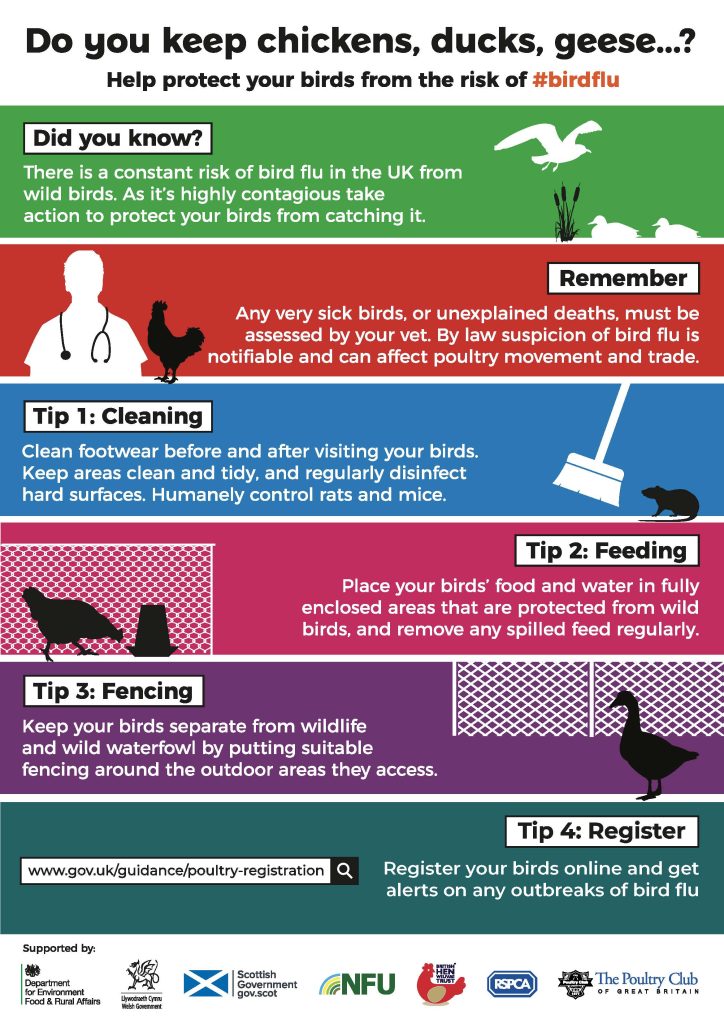Reminder to bird keepers of new legal requirement to help contain bird flu
Bird Keepers are being reminded they are now legally required to keep their birds indoors under new government measures to control the spread of avian flu.
The legislation which came into force on Monday 29 November 2021, in a bid to minimise contact with wild birds migrating from mainland Europe, comes after a number of confirmed cases across the UK in recent weeks, including a case in Chirk near the north Shropshire border.

Advice for bird keepers
The housing measures mean that it is now a legal requirement for all bird keepers across the UK to keep their birds indoors and to follow strict biosecurity measures in order to limit the spread of and eradicate the disease.
Biosecurity actions for poultry keepers (both commercial and recreational/back yard keepers)
There are some simple measures that all poultry keepers should take to protect their birds against the threat of avian flu. These apply to people running a large commercial farm, keeping a few hens in their back garden and those rearing game birds. These include:
- Keep the area where birds live clean and tidy, control rats and mice and regularly clean and disinfect any hard surfaces
- Keep chickens and turkeys completely separate from ducks and geese
- Conduct regular maintenance checks on their sheds
- Clean moss off the roofs, empty gutters and remove vegetation between sheds where birds are kept
- Draw up contingency plans for storing bedding and dealing with pests
- Place birds’ feed and water in fully enclosed areas that are protected from wild birds, and remove any spilled feed regularly
- Put fencing around outdoor areas where birds are allowed and limit their access to ponds or areas visited by wild waterfowl
- Clean and disinfect footwear before and after entering premises where birds are kept
Avian influenza is not air-borne, except over very short distances. It is spread by movement of infected birds or contact with respiratory secretions and in particular faeces, either directly or through contaminated objects, clothes and vehicles.
UK Health Security Agency has confirmed that the risk to public health is very low and the Food Standards Agency has said that bird flu poses a very low food safety risk for UK consumers and it does not affect the consumption of poultry or eggs.
Spot the signs of Bird Flu
- Unusual quietness, decreased activity levels
- Decreased levels of vocalisation.
- Decreased levels of feed & water consumption
- Decreased egg production
My bird is sick what should I do?
If you are concerned about the health of your pet, please seek advice from your vet.
For more information about bird flu and biosecurity, visit the Defra website at https://www.gov.uk/guidance/avian-influenza-bird-flu or phone 03459 33 55 77 for the Defra Helpline.
Register your poultry
You should register your poultry, even if only kept as pets, so APHA can contact you during an outbreak. This is a legal requirement if you have 50 or more birds. Poultry includes chickens, ducks, turkeys, geese, pigeon (bred for meat), partridge, quail, guinea fowl and pheasants.

You should register your poultry, even if only kept as pets,
You can sign up to their alerts service to keep up to date with the latest news. You can also get Defra email alerts
Rachel Robinson, director of public health at Shropshire Council said:
“Avian influenza is primarily a disease of birds. While transmission of avian influenza viruses to people is extremely rare and transmission may occur as a result of direct contact with infected poultry or other birds or their faeces and can cause illness in the human population.
“Whether you keep just a few birds or thousands, you are now legally required to do this on your farm or small holding. It is in your interests to do so in order to protect your birds from this highly infectious disease.
“Wild birds migrating to the UK from mainland Europe during the winter months can carry the disease and where wild birds are allowed to mix with domestic poultry this can lead to the disease spreading to captive birds.
“Bird keepers should remain alert for any signs of disease, report suspected disease immediately and ensure they are maintaining good biosecurity on their premises.”
What do I do if I find a dead bird?
The Animal and Plant Health Agency (APHA) carries out year-round avian influenza surveillance of dead wild birds submitted via public reports and warden patrols.
 If you spot a dead wild bird, report them to the Defra helpline
If you spot a dead wild bird, report them to the Defra helpline
If you find dead swans, geese or ducks or other dead wild birds, such as gulls or birds of prey, you should report them to the Defra helpline on 03459 33 55 77. Do not touch or pick up any dead or visibly sick birds that you find. For further information see advice to the public.
Some birds may be collected for disease surveillance purposes. Not all birds will be collected and responsibility for disposal of dead birds’ rests with the landowner.
For further information about the disposal of dead birds please take a look at the UK Government Website https://www.gov.uk/guidance/avian-influenza-bird-flu#public
You can keep up to date with the Avian Flu on the UK government website at https://www.gov.uk/guidance/avian-influenza-bird-flu

